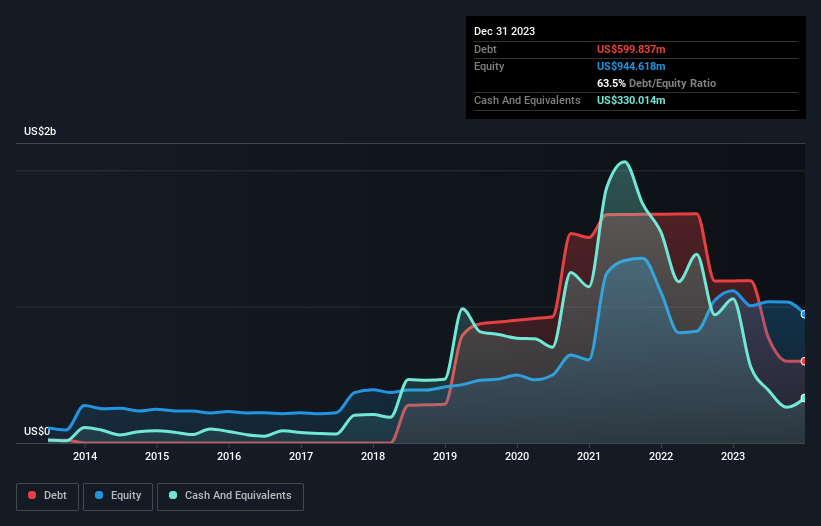Some say volatility, rather than debt, is the best way to think about risk as an investor, but Warren Buffett famously said that 'Volatility is far from synonymous with risk.' So it might be obvious that you need to consider debt, when you think about how risky any given stock is, because too much debt can sink a company. Importantly, Chegg, Inc. (NYSE:CHGG) does carry debt. But should shareholders be worried about its use of debt?
When Is Debt Dangerous?
Generally speaking, debt only becomes a real problem when a company can't easily pay it off, either by raising capital or with its own cash flow. If things get really bad, the lenders can take control of the business. However, a more frequent (but still costly) occurrence is where a company must issue shares at bargain-basement prices, permanently diluting shareholders, just to shore up its balance sheet. Of course, plenty of companies use debt to fund growth, without any negative consequences. The first step when considering a company's debt levels is to consider its cash and debt together.
See our latest analysis for Chegg
What Is Chegg's Net Debt?
The image below, which you can click on for greater detail, shows that Chegg had debt of US$599.8m at the end of December 2023, a reduction from US$1.19b over a year. However, because it has a cash reserve of US$330.0m, its net debt is less, at about US$269.8m.

A Look At Chegg's Liabilities
Zooming in on the latest balance sheet data, we can see that Chegg had liabilities of US$518.5m due within 12 months and liabilities of US$264.2m due beyond that. Offsetting these obligations, it had cash of US$330.0m as well as receivables valued at US$31.4m due within 12 months. So it has liabilities totalling US$421.2m more than its cash and near-term receivables, combined.
Chegg has a market capitalization of US$740.2m, so it could very likely raise cash to ameliorate its balance sheet, if the need arose. However, it is still worthwhile taking a close look at its ability to pay off debt. There's no doubt that we learn most about debt from the balance sheet. But it is future earnings, more than anything, that will determine Chegg's ability to maintain a healthy balance sheet going forward. So if you want to see what the professionals think, you might find this free report on analyst profit forecasts to be interesting.
In the last year Chegg had a loss before interest and tax, and actually shrunk its revenue by 6.6%, to US$716m. We would much prefer see growth.
Caveat Emptor
Importantly, Chegg had an earnings before interest and tax (EBIT) loss over the last year. To be specific the EBIT loss came in at US$13m. Considering that alongside the liabilities mentioned above does not give us much confidence that company should be using so much debt. So we think its balance sheet is a little strained, though not beyond repair. Surprisingly, we note that it actually reported positive free cash flow of US$163m and a profit of US$18m. So one might argue that there's still a chance it can get things on the right track. When analysing debt levels, the balance sheet is the obvious place to start. But ultimately, every company can contain risks that exist outside of the balance sheet. For example Chegg has 3 warning signs (and 1 which is a bit concerning) we think you should know about.
At the end of the day, it's often better to focus on companies that are free from net debt. You can access our special list of such companies (all with a track record of profit growth). It's free.
New: AI Stock Screener & Alerts
Our new AI Stock Screener scans the market every day to uncover opportunities.
• Dividend Powerhouses (3%+ Yield)
• Undervalued Small Caps with Insider Buying
• High growth Tech and AI Companies
Or build your own from over 50 metrics.
Have feedback on this article? Concerned about the content? Get in touch with us directly. Alternatively, email editorial-team (at) simplywallst.com.
This article by Simply Wall St is general in nature. We provide commentary based on historical data and analyst forecasts only using an unbiased methodology and our articles are not intended to be financial advice. It does not constitute a recommendation to buy or sell any stock, and does not take account of your objectives, or your financial situation. We aim to bring you long-term focused analysis driven by fundamental data. Note that our analysis may not factor in the latest price-sensitive company announcements or qualitative material. Simply Wall St has no position in any stocks mentioned.
About NYSE:CHGG
Chegg
Provides individualized learning support to students that helps build essential academic, life, and job skills to achieve success in the United States and internationally.
Excellent balance sheet and good value.
Similar Companies
Market Insights
Community Narratives




